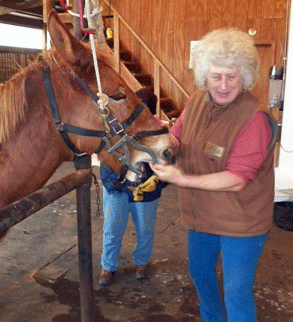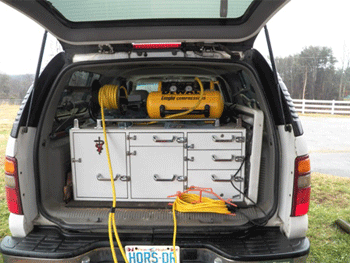Walnut Cove, North Carolina Call us: (336) 593-5422
Latitude 36 Mobile Veterinary Services
E-mail: lat36vet@aol.com
(copy & paste this address into your mail program)
Equine Dentistry
Dr. Gemeinhardt uses sedation, a full-mouth dental speculum, and motorized dental equipment to diagnose and treat the common dental disorders of horses. This approach allows her to:
* thoroughly examine the inside of your horse's mouth
* inspect each tooth individually
* look at the way your horse uses his jaws and wears his teeth
* correct even minor abnormalities
These things are important for your horse's comfort and function, not just when he's eating, but also when he's working. It surprises many people to learn that even minor dental problems can affect the horse's movement and performance.
What we need
Because the horse is sedated for the procedure, it must be done in a safe, undercover area that has nonslip footing (e.g. a dry stall). We also need a grounded ("3-prong") electrical outlet to run the compressor that powers the dental floats.
Dr. Gemeinhardt routinely brings a skilled assistant with her when performing equine dentistry. This approach allows her to work safely and efficiently. So, while we want you to be present for dentistry, we can proceed without you if necessary, as long as you have given us a signed release.
A sedated Rosie stands quietly
for her dental exam.
The air compressor stays in the back of the truck and powers the dental floats from outside the barn.





